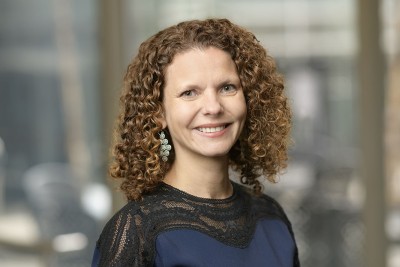
Memorial Sloan Kettering’s Clinical Genetics Service (CGS) was established in 1992 with one doctor who provided preventive medical guidance based on family history of cancer and other risk factors, such as being diagnosed with certain cancers at a young age. A genetic counselor was soon hired, and from 1993 until 2000, CGS was part of the Department of Human Genetics.
In 1996, MSK physician-scientist Kenneth Offit discovered the most common BRCA2 genetic mutation. It is seen mostly in individuals of Ashkenazi ancestry. CGS researchers later carried out the first prospective study showing the benefit of risk-reducing oophorectomy (removal of the ovaries and fallopian tubes) in people with BRCA mutations. In addition, they discovered new genetic causes of breast, ovarian, and colon cancers as well as lymphoma and childhood leukemia.
In 2001, the CGS became part of the Department of Medicine. The number of patients seen annually increased from 200 appointments in 1994 to more than 1,000 by 2007 and more than 4,000 in 2018. The CGS has continued to grow and now includes nearly 20 genetic counselors and seven doctors.
Ongoing Research in Clinical Genetics
MSK’s CGS continues to lead a growing clinical and research program. We are dedicated to the discovery of new genomic markers that can guide the prevention, diagnosis, and treatment of cancer. We also work to learn how to use those markers to better care for our patients. The CGS’s research laboratory, which is now part of the Robert and Kate Niehaus Center for Inherited Cancer Genomics, is directed by Dr. Offit.
Ongoing areas of research include the inherited genetics of pediatric, breast, gastrointestinal, gynecologic, genitourinary, and lung cancers as well as blood cancers and other tumor types. We focus especially on cancers that are diagnosed in people at a young age and people with multiple cancers.
MSK’s Clinical Genetics Team
Our doctors are experts in the field of cancer genetics. Our genetic counselors are skilled in explaining genetic testing and cancer risk assessment in a clear and understandable manner.
Our team will take as much time with you as you need to help you understand your personal and family history of cancer. We assess what, if any, genetic testing may be useful. If you have already had genetic testing, we will help you and your family members understand the results of those tests and make recommendations for managing your cancer risk.
As the field of hereditary cancer research continues to grow at a fast pace, MSK’s CGS team strives to incorporate the latest knowledge and research into the care of every individual and family seen at MSK.

